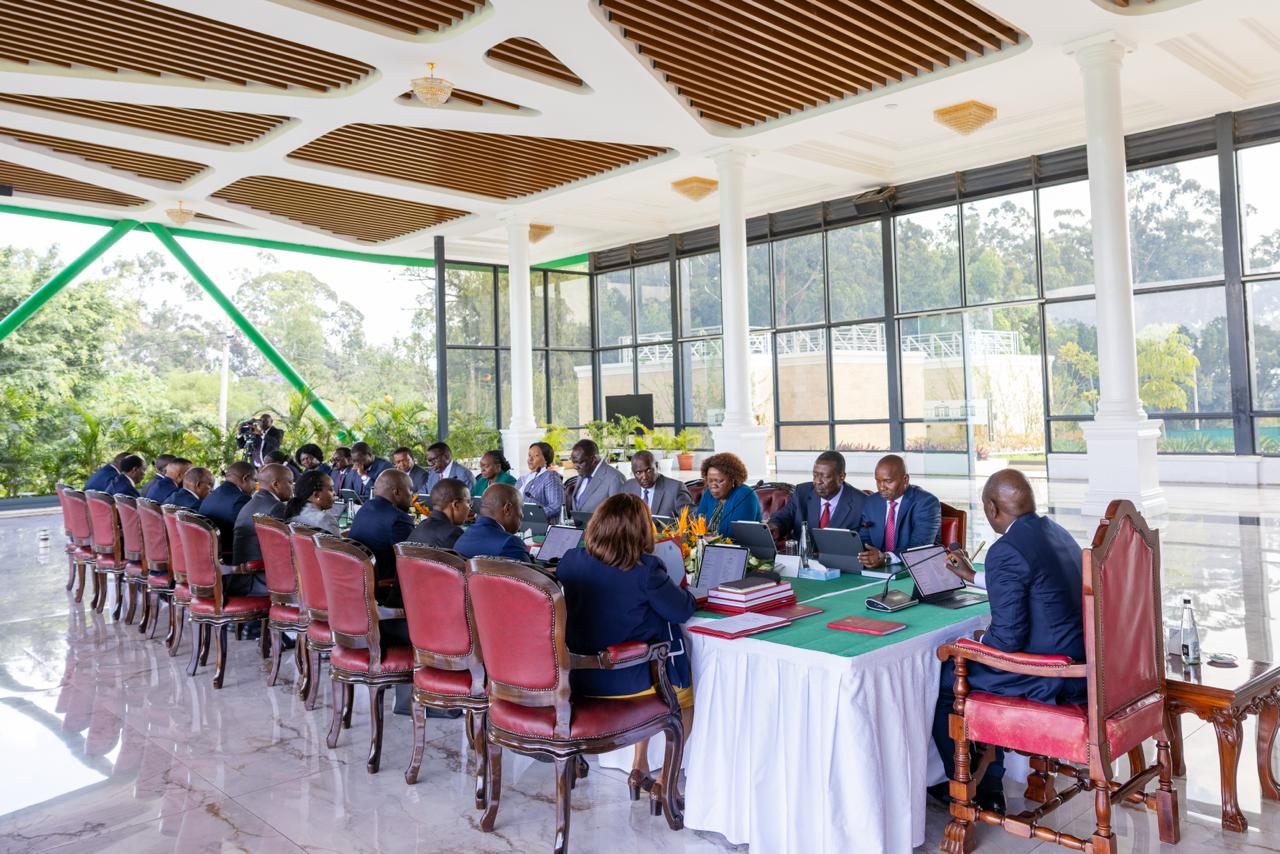 President William Ruto chairs Cabinet meeting at State House on Tuesday, November 11, 2025. /PCS
President William Ruto chairs Cabinet meeting at State House on Tuesday, November 11, 2025. /PCSThe Cabinet has approved the establishment of a new embassy in Vatican City to deepen diplomatic engagement with the Holy See and advance Kenya’s global diplomacy.
A dispatch released by State House after a meeting held on Tuesday and chaired by President William Ruto said the resident embassy will deepen bilateral relations, enhance collaboration in peace‑building, climate action, humanitarian initiatives and strengthen engagement with the Vatican’s global network of faith‑based institutions.
“The move will also boost cooperation with Catholic development agencies that run more than 7,700 schools and 500 health facilities in Kenya, supporting the Bottom‑Up Economic Transformation Agenda through expanded partnerships in education, healthcare, and social welfare,” the dispatch said.
The Cabinet further approved the establishment of new embassies in Copenhagen (Denmark) and Hanoi (Vietnam) to expand Kenya’s diplomatic footprint, strengthen bilateral and trade relations and advance the country’s strategic interests globally.
Kenya’s decision to open a dedicated embassy in Vatican City marks a milestone in its diplomatic strategy.
Formal relations between Kenya and the Holy See were established in 1965.
Over the years, the Catholic Church has played an instrumental role in Kenya’s development landscape: thousands of schools and hundreds of health facilities serve communities across the country, making faith‑based agents key partners in social welfare and human capital development.
The new embassy is therefore poised to leverage that long‑standing institutional presence and embed Kenya’s diplomacy in a wider “moral” and global engagement track.
Turning to Denmark, Kenya, and the Kingdom of Denmark have maintained diplomatic relations since 1964.
Denmark has been active in Kenya through development cooperation, including a signed strategic framework covering the period 2021–2025, aligned with Kenya’s Vision 2030.
Among the concrete trade and development links, Denmark in 2021 committed USD 17.5 million (Sh2,257,500,000) to support Kenya’s “green trade efforts” and response to the Covid‑19 pandemic.
While direct commercial trade volume is modest, the presence of the Danish Trade Council in Nairobi provides Danish companies with local market intelligence and support in agriculture, energy and renewable sectors.
By approving a resident embassy in Copenhagen, Kenya signals a deeper intention to harness Denmark’s strengths in sustainable development, green technologies and investment partnerships.
In the case of Vietnam, Kenya, and the Socialist Republic of Vietnam formally established diplomatic relations on 21 December 1995.
Trade ties between the two countries, while still emerging, are quantifiable. In 2023, Kenyan exports to Vietnam amounted to about USD 22.03 million (Sh2,841,870,000), composed largely of bran, dried legumes and nuts.
Meanwhile, Kenya imported goods from Vietnam valued at approximately USD 59.47 million (Sh7,671,630,000) in the same year.
The Vietnamese side has also shown interest in investment in Kenya, for example, through construction firms that secured bids for social housing projects in Kenya.
The decision to establish an embassy in Hanoi thus aligns with Kenya’s agenda to diversify partnerships, tap into Asian markets, and secure infrastructure and investment prospects.
The establishment of these new embassies carries several implications for Kenya. First, the resident embassy in Vatican City will strengthen moral‑diplomatic ties, enabling Kenya to engage more proactively with faith‑based institutions, humanitarian networks and climate‑action platforms anchored in the Holy See.
Such a mission bolsters Kenya’s global profile not only as an economic actor but also as a values‑based partner in peace, development and dialogue.
Second, by deploying missions in Denmark and Vietnam, Kenya is stepping up its diplomatic outreach to Western and Asian markets, respectively, to secure trade, technology transfer, green investment and enhanced consular services.
Third, these moves reflect Kenya’s broader foreign‑policy orientation: leveraging economic diplomacy to support the Bottom-Up Economic Transformation Agenda, positioning itself as a gateway for East Africa while forging diversified multiple partnerships beyond traditional blocs.
In practical terms, resident embassies offer the benefits of closer government‑to‑government engagement, faster negotiation of bilateral agreements, improved consular capacity for Kenyans abroad, and greater visibility in the host countries’ policy‑making circles.
The total of the Cabinet’s approvals represents a strategic diplomatic expansion – one that integrates moral‑humanitarian dimensions through the Vatican City mission, sustainable development and green economy partnerships via Denmark, and Asian trade and infrastructure potential through Vietnam.
The new diplomatic architecture underscores Kenya’s ambition to amplify its voice and influence in global affairs, attract investment, and deepen bilateral cooperation across sectors.













